

C3T3 ABC Situation ethics booklet. SitEthics. RS - Philosophy & Ethics. Joseph Fletcher In 1966 Joseph Fletcher, an American theologian, published a book, Situation Ethics, in which he outlines a new approach to Christian ethical decision making.

Although his ideas were rooted in the Bible they were new, and to some shocking! Fletcher was a professor of Christian ethics at Harvard University and then medical ethics at Virginia University.He later became an atheist and was involved with the American Euthanasia Association and the Association for Voluntary Sterilization. Ethics for A-Level - Chapter 5. Fletcher’s Situation Ethics - Open Book Publishers. 1 JF.

Fletcher, Situation Ethics. People like to wallow or cower in the security of the law.1 2 K.E. Kirk, Conscience and its Problems, p. 331. Every man must decide for himself according to his own estimate of conditions and consequences … 2 1In the introduction to The Situation Ethics: The New MoralityJoseph Fletcher (1905 – 1991) develops what he calls an ethical non-system. 3 Ibid., p. 15. 2Although there is the clothing of religion in the book — Fletcher uses religious terms such as “agápe” and cites famous theologians such as Rudolf Bultmann (1884 – 1976) — the central ideas do not rely on the truth of any particular religion. 3Fletcher calls this ethical “non-system” Situationism and a Bible story will illustrate the general point of the book. Resource. 1b new morality and christian reactions.
2 legalism and antinomianism (1) 3 situational and agape. 8 fletchers case studies. 8 application of situation ethics homosexual and polyamorous relationships. A Level Theme 3 A&B Situation Ethics by Jon Mayled from RS Review Jan 2011. Situation ethics pmb powerpt. The West Wing- Bible Lesson.
An Introduction to Situation Ethics. 8. Situation Ethics: Compatiblility with Christianity. The Four Working Principles of Situation Ethics. Situation Ethics Explained by Peter Baron from Peped. Evaluating Situation Ethics by Peter Baron from Peped. 02 C3T3 A&B Situation Ethics charlotte vardy. Polyamory & The Risk Of Being Left Behind: Louis Theroux. The 4 Types of Polyamory. I Was Wrong About Open Relationships. Situation ethics - Document in A Level and IB Religious Studies. 2 explain situation ethics. 1b new morality and christian reactions. That Religious Studies Website: Situation Ethics.
SitEth Textbook Section A. Ethics for A-Level - Chapter 5. Fletcher’s Situation Ethics - Open Book Publishers. SitEth Textbook Section C. SitEth Textbook Section B. This Vatican adviser is moving Catholics toward LGBT inclusion. That Religious Studies Website: Situation Ethics (Part 2): Three Approaches to Decision-Making. "At bottom there are only three alternative routes or approaches to follow in making moral decisions: (1) the legalistic; (2) the antinomian… and (3) the situational.
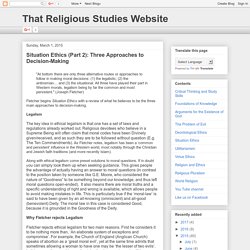
All three have played their part in Western morals, legalism being by far the common and most persistent. " (Joseph Fletcher) Fletcher begins Situation Ethics with a review of what he believes to be the three main approaches to decision-making. Legalism The key idea in ethical legalism is that one has a set of laws and regulations already worked out. Along with ethical legalism come preset solutions to moral questions. Why Fletcher rejects Legalism Fletcher rejects ethical legalism for two main reasons. Legalism is also ‘cold and abstract’, because it places the Law above the needs of persons. Antinomianism The key idea in antinomianism, is that there are no rules.
Fletcher has been wrongly accused of being an Antinomian. Why Fletcher rejects Antinomianism Situationism "Not the “good” or the “right” but the fitting. " Review. Church of England to discuss same-sex blessing. Image copyright PA The Church of England is to debate holding services for same-sex couples for the first time.
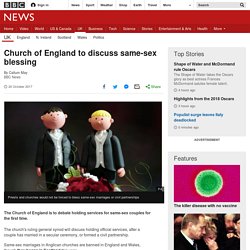
The church's ruling general synod will discuss holding official services, after a couple has married in a secular ceremony, or formed a civil partnership. Same-sex marriages in Anglican churches are banned in England and Wales, though they began in Scotland this year. Traditionalists have called the plans a "fundamental departure". However the idea for the services has been welcomed by LGBT campaigners in the church. The plans have been put forward by the diocesan synod in Hereford, which voted in favour of an "order of prayer and dedication" following a marriage or civil partnership, in response to couples who said they wanted it.
The Bishop of Hereford, the Right Reverend Richard Frith, said: "Clergy are already encouraged to respond pastorally and sensitively when approached. Individual churches and priests would be able to opt out of holding the services if they wished. SitEthics. Situation Ethics - Philosophical Investigations. Situation Ethics - Notes. SMC Workbook Situation Ethics. A Level Theme 3 A&B Situation Ethics SUMMARY SHEET. A Level Theme 3 A&B Situation Ethics by Ashley Wilson from Challenging Religious Issues 2014. Homosexual and Polyamorous relationships. Has “Homosexual” always been in the Bible? — forge. As I was talking with my friend I said, “I wonder why not until 1983?
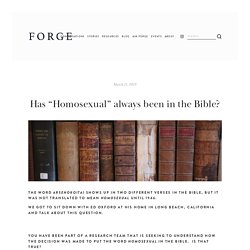
Was their influence from America?” So we had our German connection look into it again and it turns out that the company, Biblica, who owns the NIV version, paid for this 1983 German version. Thus it was Americans who paid for it! In 1983 Germany didn’t have enough of a Christian population to warrant the cost of a new Bible translation, because it’s not cheap. So an American company paid for it and influenced the decision, resulting in the word homosexual entering the German Bible for the first time in history. I also have a 1674 Swedish translation and an 1890 Norwegian translation of the Bible.
So then I started thinking that of 4 of the 6 clobber passages, all these nations and translations were referring to pederasty, and not what we would call homosexuality today. Well, they didn’t operate out of a vacuum when they translated something. Absolutely! YES! Yes, absolutely! 1.) How might a situationist deal with the morality of homosexual relationships. Polyamorous Relationships questions textbook. A Level Ethics Theme 3C Polyamorous in Portland the city making open relationships easy Life and style. Polyamorous in Portland: the city making open relationships easy. When Franklin Veaux was 10 years old, his elementary school English teacher read his class a story about a princess being wooed by two princes.

“I thought, princesses live in castles, and castles are big enough for all three of them, so why does she have to choose one?” He said. LGBT Muslim festival: 'We don't just have one identity' Image copyright Getty Images "I think we've earned a party," says 29-year-old Joy Muhammad.
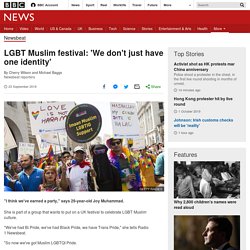
She is part of a group that wants to put on a UK festival to celebrate LGBT Muslim culture. "We've had Bi Pride, we've had Black Pride, we have Trans Pride," she tells Radio 1 Newsbeat. "So now we've got Muslim LGBTQI Pride. "It'll celebrate the diversity within the BAME community and the LGBT community to show we're not all the same, we don't have just one identity. Dr Luke Brunning talks about Non-monogamy and philosophy – Philosophy & Religion Video Interviews.
Possible Questions on Situation Ethics. Situation Ethics and Homosexual Relationships making notes. Whistleblower: Catholics must work together to change church's mindset on homosexuality. Jesuit Fr.
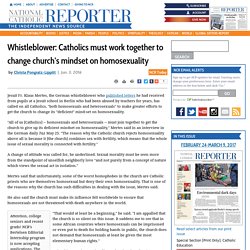
Klaus Mertes, the German whistleblower who published letters he had received from pupils at a Jesuit school in Berlin who had been abused by teachers for years, has called on all Catholics, "both homosexuals and heterosexuals" to make greater efforts to get the church to change its "deficient" mind-set on homosexuality. "All of us [Catholics] -- homosexuals and heterosexuals -- must join together to get the church to give up its deficient mindset on homosexuality," Mertes said in an interview in the German daily Taz May 25.
"The reason why the Catholic church rejects homosexuality above all is because it [the church] combines sex with fertility, which means that the whole issue of sexual morality is connected with fertility. " A change of attitude was called for, he underlined. Sexual morality must be seen more from the standpoint of unselfish neighborly love "and not purely from a concept of nature which views the sexual act in isolation.
" Homosexual and Polyamourous relationships. Loving More Your #1 Resource for Polyamory. Polyamory - Wikipedia. Polyamory (from Greek πολύ poly, "many, several", and Latin amor, "love") is typically the practice of, or desire for, intimate relationships where individuals may have more than one partner, with the knowledge and consent of all partners.[1] [2]It has been described as "consensual, ethical, and responsible non-monogamy".[3][4][5] However, the meaning of polyamory is also an issue of ongoing debate.[4] For example, although polyamory is typically defined as a relationship practice or approach to relationships,[1][2][6] some believe that it should also be considered an orientation or identity (analogous to sexual orientation or gender identity).[7][8] Polyamory is sometimes used in a broader sense, as an umbrella term that covers various forms of consensual multi-partner relationships, or forms of consensual non-exclusive sexual and/or romantic relationships.
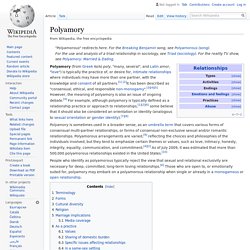
Terminology[edit] No single definition of "polyamory" has universal acceptance. What does St Paul say about homosexuality? Was St.
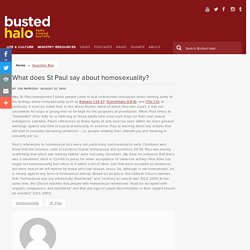
Paul homophobic? Some people come to that unfortunate conclusion when reading some of his writings about homosexuality such as Romans 1:24-27; 1Corinthians 6:9-10; and 1Tim 1:10. In particular, it must be noted that, in the Greco-Roman world of which Paul was a part, it was not uncommon for boys or young men to be kept for the purposes of prostitution. When Paul refers to “Sodomites” (1Cor 6:9), he is referring to those adults who used such boys for their own sexual indulgence. Likewise, Paul’s references to these types of acts must be seen within his more general warnings against any kind of sexual promiscuity. Religious Attitudes Towards Polyamory. Polyamory. Practice of or desire for intimate relationships with more than one partner Terminology[edit] The word polyamorous first appeared in an article by Morning Glory Zell-Ravenheart, "A Bouquet of Lovers", published in May 1990 in Green Egg Magazine, as "poly-amorous".[10] In May 1992, Jennifer L.
Wesp created the Usenet newsgroup alt.polyamory,[11] and the Oxford English Dictionary cites the proposal to create that group as the first verified appearance of the word.[10] The words polyamory, polyamorous, and polyamorist were added to the OED in 2006.[12] However, as early as 1999 Zell-Ravenheart was asked by the editor of the OED to provide a definition of the term, and had provided it for the UK version as "the practice, state or ability of having more than one sexual loving relationship at the same time, with the full knowledge and consent of all partners involved. Polyamory: Another Attack on Real Love (Part 3) - Stumbling Toward Sainthood. I am embarrassingly late in writing this, but I figure better late than never.
Over the summer, I wrote a two-part series talking about the problems with polyamory and how Christians should respond. A writer who focuses on poly topics wrote some responses. I wanted to offer some points of clarification. I do want to add a disclaimer that his posts use some crude language (fairly minimal though) and display the typical basic misunderstandings about Catholicism.
That being said, I do think it is important to read perspectives that differ from our own. A level Theme 3C polyamorous relationship work Daily Mail Online October 2016. ‘Discovering my true sexual self’: why I embraced polyamory. It was the hardest thing I’d ever had to say to my husband, Marc. Three years ago, I sat down and told him: “The idea of having sex just with you for the next 40 years – I can’t do it any more.”
But I had come to realise that my life was built around something I didn’t believe in: monogamy. We had been together for 12 years and had two children, now nine and seven. I love being a mother and I set the bar high from the start – cloth nappies and cooking from scratch. But I needed something more in my emotional and sexual life. Marc’s reaction was remarkable; he agreed to support me and open our marriage to other partners, although it wasn’t really what he wanted. If that sounds difficult, it was. I quickly embraced the dating scene and discovered another side of my sexual self.
I became convinced that traditional relationships are like an air lock. This woman shares her boyfriend with his husband. Philosophy Articles : Polyamory by Philosophy Talk. Two women who had babies by the same man say why their polyamorous relationship works. Two women and a man who are enjoying a polyamorous relationship have welcomed two new sons into their family. Damien Sullivan, born in February, and his half brother Ryan, who was born four months later, were both fathered by Buddy from San Diego, California. The boys will be raised by Buddy and two mothers - Rose (Ryan's biological mother) and Lauren (Damien's biological mother) - as the three parents are in a poly-triad relationship.
Scroll down for video. Ethics for A-Level - Chapter 10. Sexual Ethics - Open Book Publishers.